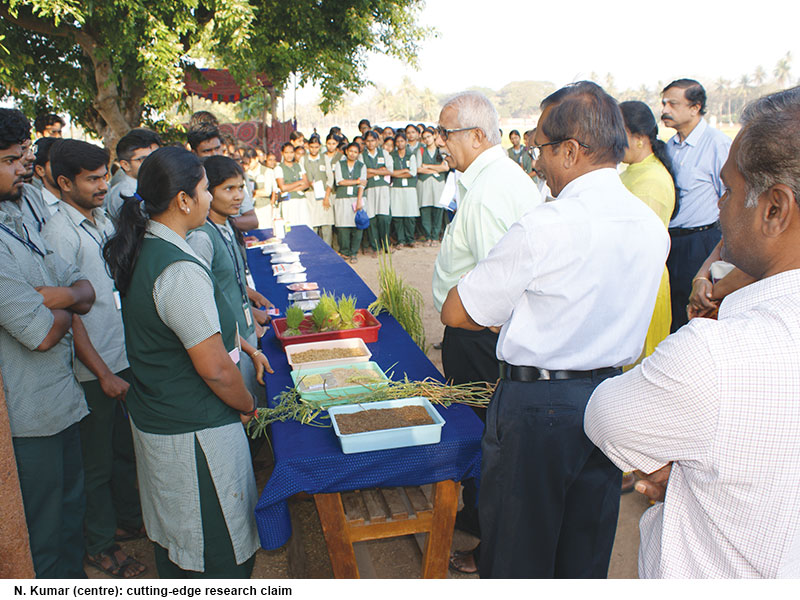
An alumnus of Tamil Nadu Agricultural University (TNAU) and former manager at UPASI (United Planters Association of South India), Dr. N. Kumar signed up as an assistant professor at TNAU in 1979. In 2018 he was appointed vice chancellor of his alma mater. Excerpts from an interview:
TNAU is ranked among India’s Top 10 (#7) agriculture universities in the ICAR Rankings 2020. What are its major achievements?
Today TNAU offers 10 undergrad, 33 postgrad and 29 Ph D programmes to 4,000 students and comprises 15 constituent colleges, 38 research stations and 14 KVK (Krishi Vidya Kendras) which deliver our lab to land extension programmes. Over the years we have developed several new strains and varieties of foodgrains, especially rice varieties which have enabled Tamil Nadu’s rice production to increase to 10 million tonnes — equivalent to 8.5 percent of India’s annual production. Our #7 ICAR ranking is very satisfactory considering we were ranked #33 in 2018. It’s also a noteworthy achievement that we have received ICAR’s Krishi Karma Award for the past five years.
How satisfied are you with the growth and development of TNAU?
TNAU is a 114-year-old university with an excellent research record. We have developed 868-plus varieties in 91 crops, 170-plus new farm machinery, and 1,500 management technologies as per the requirements of farmers and other stakeholders. New strains of crops developed by TNAU such as ADT 36, 37 and 39, and CO 51 rice, MCU 5 and MCU 7 cotton, CO FS 27 fodder sorghum, TMV 4 and TMV 6 sesame, ADT 3, ADT 5 blackgram, CO Rg 7 redgram, PKM 1 tomato, PKM 1 and 2 Moringa, are very popular with the farmers of Tamil Nadu. Moreover, nano technologies have been employed in weeds reduction, improving the germination of pulses and oilseeds, crop and soil nutrition and for containing pests etc. Besides, TNAU has evolved several agro technologies for enhancing crop growth and for optimising the use of water, nutrients, fertilisers.
Thus, the growth and development of the university is inclusive and satisfactory. In 2010 we were awarded the Sardar Patel Award for Outstanding Institution by ICAR.
Despite 60 percent of India’s population being engaged in agriculture/farming, this sector contributes only 15 percent of annual GDP. How do you explain the low productivity of Indian agriculture?
Indian agriculture can become more productive and profitable if farmers adopt the latest technology. In TNAU, we have developed agri technologies which are steadily improving the per-unit productivity of land, resources, water, nutrients, labour, machines etc, used by farmers of Tamil Nadu and beyond. If the agriculture sector is not making the contribution it should to national GDP, it’s because the high yield foodgrains and other produce strains developed by India’s agriculture universities are not reaching small farmers. It should be noted that 48 percent of our farmers are working plots of less than two hectares which makes profitable farming a very difficult proposition. Moreover the market prices of farm produce are very low even as input prices are rising.
What needs to be done to revive Indian agriculture to make this country an agriculture superpower?
To revive Indian agriculture the education system — especially primary education — of rural India needs to be urgently improved. This will enable our farmers to readily absorb the new technologies and best practices developed by the country’s 71 agriculture universities which are doing cutting edge research in high yield crop varieties. In addition, greater attention needs to be paid to developing rural infrastructure and a sizeable food processing industry which will enable farmers to get their produce to profitable markets of their choice and eliminate the massive wastage of agriculture produce annually. In this connection I am hopeful that the new telecom revolution which enables farmers to discover best prices and markets and also the reverse entry of highly educated professionals into cash crops and horticulture, will enable the spread of best practices and a brighter tomorrow for Indian agriculture.
Any other comment?
India needs to rapidly enhance the digital literacy of our farmers. Greater awareness is required in government and society that empowering farmers will inevitably empower the country and place India firmly on the road to agriculture superstardom. In this connection the three recently legislated Acts with reference to agriculture, if implemented with determination, will double farmers’ incomes by 2020 — the target set by the prime minister. Meanwhile in TNAU we are continuously developing advanced curriculums and research, which when they move from lab to land will surely make India an agriculture superpower.
Also read: India’s ivory tower agriculture universities























